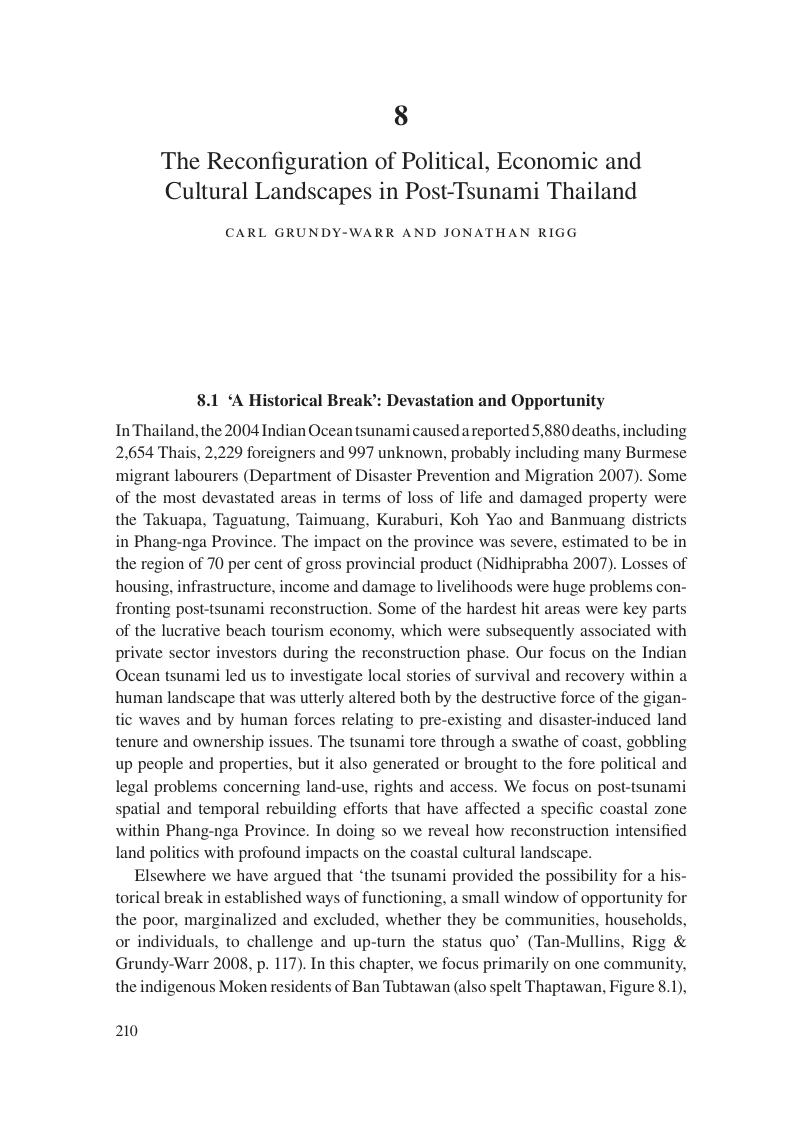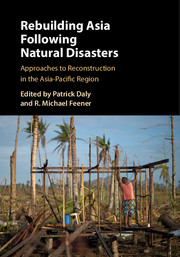Book contents
- Rebuilding Asia Following Natural Disasters
- Rebuilding Asia Following Natural Disasters
- Copyright page
- Contents
- Figures
- Tables
- Contributors
- Preface
- 1 Cycles of Destruction and Reconstruction
- 2 The Challenges of Disaster Risk Reduction in Rapidly Expanding Urban Environments
- 3 Continuity, Adaptation, and Change Following the 1993 Earthquake in Marathwada, India
- 4 Reflections on the Hanshin Earthquake of 1995 and the Reconstruction of Kobe, Japan
- 5 Post-Disaster Housing Reconstruction Lessons from the 1999 Marmara Earthquake, Turkey
- 6 Positioning Stakeholders within Owner-Driven Post-Disaster Reconstruction Approaches
- 7 Blueprints for Change in Post-Tsunami Aceh, Indonesia
- 8 The Reconfiguration of Political, Economic and Cultural Landscapes in Post-Tsunami Thailand
- 9 The Right to Adequate Housing in Post-Disaster Situations
- 10 Beyond the 2006 Yogyakarta Earthquake
- 11 Decentralizing a “Top–Down” Post-Disaster Reconstruction
- 12 Humanitarian Assistance Following the 2011 Floods in Thailand and Cambodia
- 13 The Insurance Industry and Integrated Project Management Frameworks in Post-Disaster Reconstruction
- 14 Devastating Consequences, Flawed Responses
- 15 Post-Disaster Reconstruction in Asia
- Index
- References
8 - The Reconfiguration of Political, Economic and Cultural Landscapes in Post-Tsunami Thailand
Published online by Cambridge University Press: 05 March 2016
- Rebuilding Asia Following Natural Disasters
- Rebuilding Asia Following Natural Disasters
- Copyright page
- Contents
- Figures
- Tables
- Contributors
- Preface
- 1 Cycles of Destruction and Reconstruction
- 2 The Challenges of Disaster Risk Reduction in Rapidly Expanding Urban Environments
- 3 Continuity, Adaptation, and Change Following the 1993 Earthquake in Marathwada, India
- 4 Reflections on the Hanshin Earthquake of 1995 and the Reconstruction of Kobe, Japan
- 5 Post-Disaster Housing Reconstruction Lessons from the 1999 Marmara Earthquake, Turkey
- 6 Positioning Stakeholders within Owner-Driven Post-Disaster Reconstruction Approaches
- 7 Blueprints for Change in Post-Tsunami Aceh, Indonesia
- 8 The Reconfiguration of Political, Economic and Cultural Landscapes in Post-Tsunami Thailand
- 9 The Right to Adequate Housing in Post-Disaster Situations
- 10 Beyond the 2006 Yogyakarta Earthquake
- 11 Decentralizing a “Top–Down” Post-Disaster Reconstruction
- 12 Humanitarian Assistance Following the 2011 Floods in Thailand and Cambodia
- 13 The Insurance Industry and Integrated Project Management Frameworks in Post-Disaster Reconstruction
- 14 Devastating Consequences, Flawed Responses
- 15 Post-Disaster Reconstruction in Asia
- Index
- References
Summary

- Type
- Chapter
- Information
- Rebuilding Asia Following Natural DisastersApproaches to Reconstruction in the Asia-Pacific Region, pp. 210 - 235Publisher: Cambridge University PressPrint publication year: 2016
References
- 3
- Cited by



